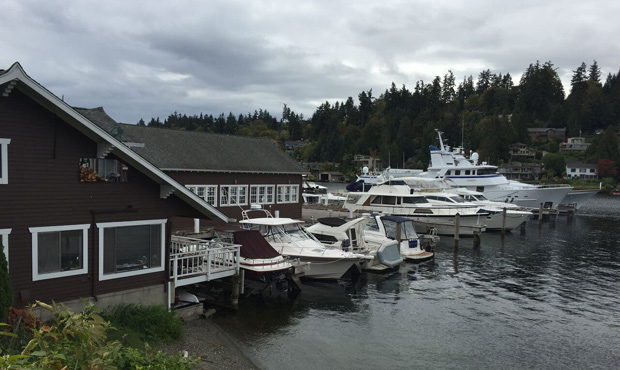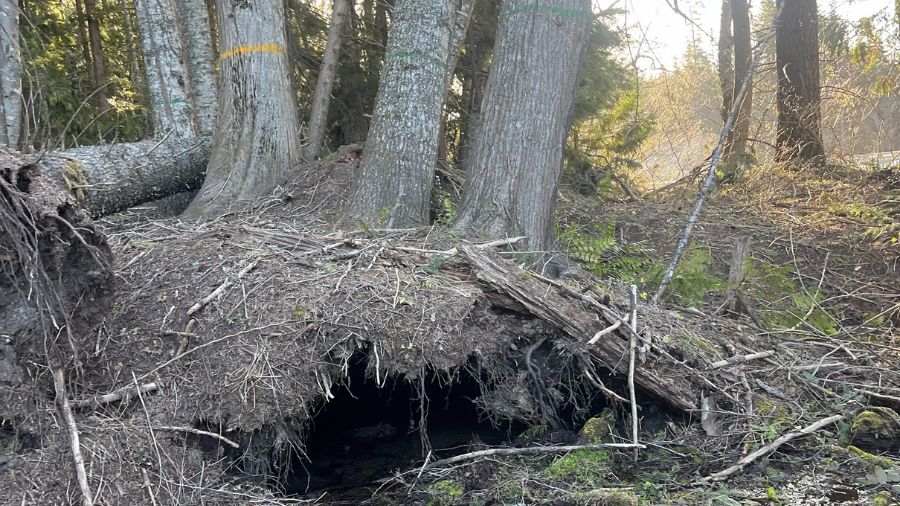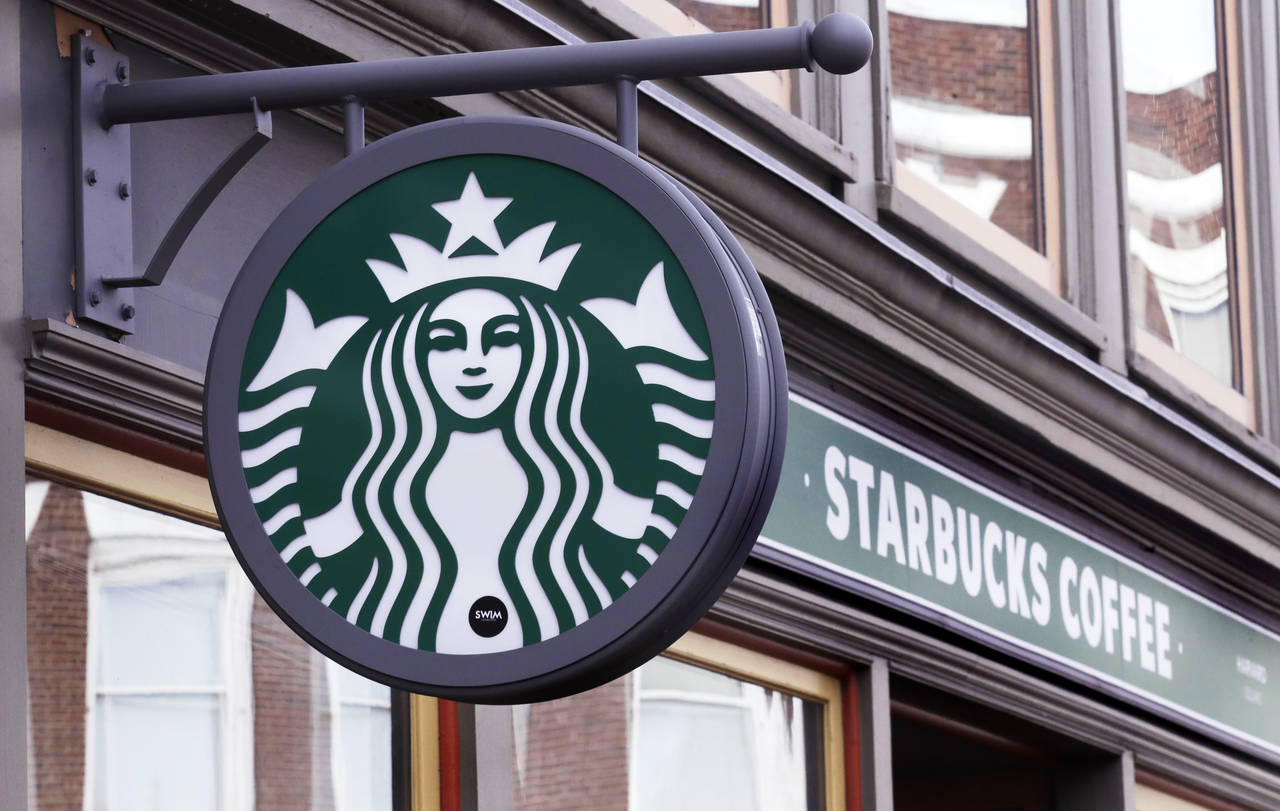Searching for the long-lost Bellevue whaling fleet
Oct 5, 2016, 5:47 AM | Updated: 9:24 am

The Bellevue Marina at Meydenbauer Bay nowadays offers moorag e to dozens of pleasure boats, but was home to the American Pacific Whaling Company between World War I and World War II. (Photo by Feliks Banel)
(Photo by Feliks Banel)
It was 75 years ago this month that the old American Pacific Whaling Company fleet returned from Alaska and tied up at their dock in Meydenbauer Bay a few blocks from what’s now downtown Bellevue. They didn’t know it then, but October 1941 was to mark the end of the last full season of whaling for the half-dozen boats that belonged to the Bellevue company.
Eastside civic leader and businessman Bill Lagen passed away back in 2007. His grandfather William Schupp brought the whaling fleet to Meydenbauer Bay just a few years after completion of the Ballard Locks and the ship canal in 1916 made Lake Washington accessible from Puget Sound, creating a sort of “next frontier” for the Puget Sound maritime industry.
Related: Reviving Lake Washington’s phantom shoreline
Lagen addressed a gathering at the Museum of History & Industry (MOHAI) in July 2002, and talked about the old family business that, in those days, didn’t have the stigma it has now.
“The reason my granddad built the whaling dock [on Meydenbauer Bay] was [because] it was out in the country, and it was freshwater, and his boats would be moored in freshwater instead of salt,” Lagen said. “There’s a tremendous difference between freshwater and saltwater on a steel hull.”
Freshwater was less corrosive, Lagen said, and helped kill barnacles on the boats.
The American Pacific Whaling Company fleet never brought any dead whales to Bellevue. According to a Seattle Times article from 1962, the steam-powered boats were equipped with harpoons for killing “blue, humpback and sperm whales in the Aleutian Islands and Bering Sea around Akutan [at the Unimak Pass entrance to the Bering Sea]and Port Hobron [on Kodiak Island].” Whale carcasses were generally taken to “whaling stations” near the hunting grounds for processing, such as Port Hobron.
In the 1930s, American Pacific was the second largest employer on the east side of Lake Washington, with the biggest payroll in the area just up the road at the shipyards in Houghton (now part of Kirkland, and site of Carillon Point). Lagen says his grandfather would take the whaling fleet to those shipyards every spring for annual maintenance.
Lagen also said that his grandfather wasn’t necessarily the most insightful businessman.
During the Great Depression of the late 1930s, the market for whale oil and sperm oil was shrinking. To pay its bills in advance of the season, the whaling company would sometimes go into debt to the federal Reconstruction Finance Corporation.
“The only buyer we had for the whale oil was Procter & Gamble, and they would pay no more than just enough to kind of keep the company going,” Lagen said.
“I can remember as a small boy being taken through [the Procter & Gamble] plant, and this fella oohed and ahhed and carried on [about how great it was]. And he showed us Crisco,” Lagen said. “They would never say what they used [the whale oil] for, but we always figured it was used for Crisco.”
Lagen also said that his grandfather was a contemporary of Bill Boeing — someone whose business decisions his grandfather apparently didn’t much approve of.
“He used to carry on all the time about Boeing and [how] that ‘damned fool Boeing put his inheritance, [was] throwing away his inheritance, in ridiculous airplanes,’” Lagen said.
Lagen said his grandfather believed he’d made a smarter choice — one with a proven track record.
“[Granddad] put his money into something with a history behind it,” Lagen said, laughing. “And he was right, the history was behind it.”
While the market for whale oil had shrunk, it took the outbreak of World War II and the threat of Japanese military action in the Aleutians to finally wipe out the Bellevue-based whaling fleet.
“We were going to whale in 1942. The government advanced the money to the company to get the harpoons straight and get the boats fixed up,” Lagen said.
“[As a] matter of fact, we even had men up in the station [in Alaska] when the Navy changed their mind and said, ‘No, on second thought, no we’re not going let you operate,’” Lagen said.
“[We were] too close to Dutch Harbor, 40 miles or so,” he said, where the military threat was too great. “And that was the end of the whaling company.”
Lagen said the military took over the fleet of whaling boats for various uses during the war and took over the Meydenbauer dock as a base.
“The ‘Unimak’ was sold to the Army and she was made into, I’m told, but I’ve never seen her, nobody has ever seen her, but she was an icebreaker for the Army,” Lagen said. “I can think of no outfit in the United States other than the U.S. Army that would use one of the whalers as an icebreaker.”
“The other boats they took over, along with me to show them how to run them, in the Coast Guard inshore patrol,” Lagen said, cruising coastal waters and keeping an eye out for the enemy.
After the war, Lagen’s grandfather William Schupp sold off the remains of the whaling business to others who saw a future in the industry, but he held onto the Bellevue real estate.
Related: J.P. Patches’ legacy lives on in the Pacific Northwest
Schupp died in 1947 at age 82, and in the 1950s Lagen eventually converted the old whaling dock to the Meydenbauer Bay Marina and operated it for 40 years. Bill Lagen sold the land and business to the City of Bellevue back at the end of 1997 for $6.3 million; Lagen then sold his adjacent home to the City in 2001 for $3.9 million.
The City of Bellevue continues to operate the marina, and beginning early next year, will begin a construction project that includes renovation and preservation of the old whaling building and relocation of a major sewer line from along the lakeshore to farther inland.
Project manager Scott Vander Hyden of the City of Bellevue Department of Parks and Community Services says no date has been set for a larger project that might some day close down the marina and convert all of the city’s waterfront property in Meydenbauer Bay into a contiguous park.
Driving on Main Street through Old Bellevue 75 years after the whaling fleet tied up for good, it’s hard to spot much in the way of any evidence of the area’s former role. But a search through old newspaper clippings reveals that in 1969, designers of what was then the brand-new Bellevue Holiday Inn at Main and 112th (now the Red Lion) were inspired by Meydenbauer Bay history to name the hotel’s restaurant “Jonah and The Whale”; to name the hotel bar “Jonah”; and to name the hotel coffee shop “The Galley.”
The Galley had “three shiny varnished shoreboats” hanging from the ceiling, and an “abstract sculpture of a whale by Robert Stanton” in the lobby. Nowadays, the whale has, literally, left the building and the place is just called Jonah’s Restaurant and Lounge.
Continuing to drive west a few blocks from the Red Lion and down the hill toward Lake Washington, there’s just one obvious clue to the Meydenbauer neighborhood’s storied past.
Across the street from the old dock stands a huge condominium complex that was built in late 1970s. There, in foot-high letters, on a big sign at the top of the driveway, it says “Whaler’s Cove.”

















